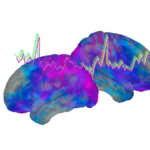Lien vers Pubmed [PMID] – 37607822
Lien DOI – 10.1523/JNEUROSCI.0112-22.2023
J Neurosci 2023 Aug; ():
Communication difficulties are one of the core criteria in diagnosing ASD, and are often characterized by speech reception difficulties, whose biological underpinnings are not yet identified. This deficit could denote atypical neuronal ensemble activity, as reflected by neural oscillations. Atypical cross-frequency oscillation coupling, in particular, could disrupt the joint tracking and prediction of dynamic acoustic stimuli, a dual process that is essential for speech comprehension. Whether such oscillatory anomalies already exist in very young children with ASD, and with what specificity they relate to individual language reception capacity is unknown. We collected neural activity data using electroencephalography (EEG) in 64 very young children with and without ASD (mean age 3; 17 females, 47 males) while they were exposed to naturalistic-continuous speech. EEG power of frequency bands typically associated with phrase-level chunking (delta, 1-3 Hz), phonemic encoding (low-gamma, 25-35 Hz), and top-down control (beta, 12-20 Hz) were markedly reduced in ASD relative to typically developing (TD) children. Speech neural tracking by delta and theta (4-8 Hz) oscillations was also weaker in ASD compared to TD children. After controlling gaze-pattern differences, we found that the classical theta/gamma coupling was replaced by an atypical beta/gamma coupling in children with ASD. This anomaly was the single most specific predictor of individual speech reception difficulties in ASD children. These findings suggest that early interventions (e.g., neurostimulation) targeting the disruption of beta/gamma coupling and the upregulation of theta/gamma coupling could improve speech processing coordination in young children with ASD and help them engage in oral interactions.Significance StatementVery young children already present marked alterations of neural oscillatory activity in response to natural speech at the time of ASD diagnosis.Hierarchical processing of phonemic- and syllabic-range information (theta/gamma coupling) is disrupted in ASD children.Abnormal bottom-up (low-gamma) and top-down (low-beta) coordination specifically predicts speech reception deficits in very young ASD children, and no other cognitive deficit.


